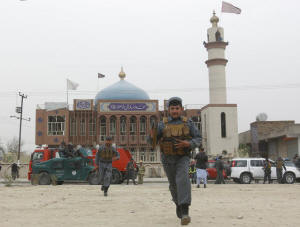|
Suicide bomber kills dozens at Shi'ite
mosque in Kabul: police
 Send a link to a friend
Send a link to a friend
 [November 21, 2016]
By Mirwais Harooni [November 21, 2016]
By Mirwais Harooni
KABUL (Reuters) - A suicide bomber killed
at least 27 people and wounded dozens on Monday in an explosion at a
crowded Shi'ite mosque in the Afghan capital Kabul, officials said, the
third major attack on minority Shi'ites in the city since July.
The attacker entered the Baqir-ul-Olum mosque shortly after midday as
worshippers had gathered for a ceremony, the interior ministry said in a
statement.
Fraidoon Obaidi, chief of the Kabul police Criminal Investigation
Department, said at least 27 people were killed and 35 wounded but that
total may rise significantly.
One survivor told Afghanistan's Ariana Television that around 40 dead
and 80 wounded had been taken from the building before rescue services
arrived at the scene. "I saw people screaming and covered in blood," he
said.
Another witness, Sayed Ali, said he had helped carry 30-35 bodies from
the mosque and believed another 100 people may be wounded.
Bloody sectarian rivalry between Sunni and Shi'ite Muslims has been
relatively rare in Afghanistan, a majority Sunni country, but the attack
underlines the deadly new dimension that growing ethnic tension could
bring to its decades-long conflict.

Already there had been two major recent attacks on Shi'ite targets in
Kabul, both claimed by Islamic State.
Last month, at least 14 people were killed when a gunman in police
uniform opened fire on worshippers gathered at a Shi'ite shrine for the
Ashura festival. In July, more than 80 people were killed in an attack
on a demonstration by the mainly Shi'ite Hazara minority.
There was no immediate claim of responsibility for Monday's attack but
the Taliban, seeking to reimpose Islamic law after they were toppled
from power in 2001, denied any involvement.
"We have never attacked mosques as it's not our agenda," said the
movement's main spokesman, Zabihullah Mujahid.
[to top of second column] |

Afghan policemen arrive in front of a mosque where an explosion
happened in Kabul, Afghanistan November 21, 2016. REUTERS/Omar
Sobhani

Any resurgence of sectarian or ethnic violence could threaten the
fragile stability of the government headed by President Ashraf
Ghani, who described the "vicious attack" as an attempt "to sow
seeds of discord".
Government Chief Executive Abdullah Abdullah said Afghanistan should
not fall victim to "enemy plots that divide us by titles".
"This attack targeted innocent civilians - including children - in a
holy place. It is a war crime & an act against Islam & humanity," he
said in a message on his Twitter account.
Thousands of civilians have been killed in Afghanistan in the 15
years since the Taliban regime was brought down in the U.S.-led
campaign of 2001.
In July, the U.N. Assistance Mission in Afghanistan reported that
1,601 civilians had been killed in the first half of the year alone,
a record since it began collating figures in 2009.
(Additional reporting by Jibran Ahmad in Peshawar; Writing by James
Mackenzie; Editing by Nick Macfie)
[© 2016 Thomson Reuters. All rights
reserved.]
Copyright 2016 Reuters. All rights reserved. This material may not be published,
broadcast, rewritten or redistributed.
 |